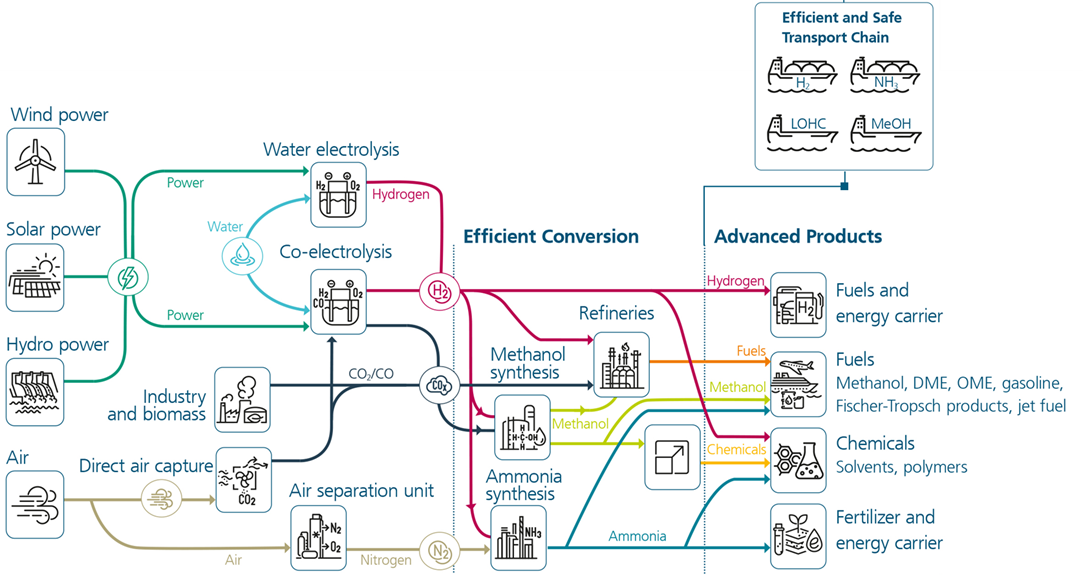Workshop “Perspectives on Power to Liquids and Power to Chemicals 2022”: International Community Highlights Research and Business Opportunities
The transformation of the global energy system towards renewable energy is the key priority of our generation and enables independence from fossil energy carriers. Hydrogen and its derivatives such as methanol and ammonia will play a key role in this transformation process. The workshop “Perspectives on Power to Liquids (PtL) and Power to Chemicals” will bring together internationally reknowned stakeholders from politics, academia and industry. They will discuss, advance and highlight synergies between renewable power generation, H2 production and CO2 utilization, targeting at the production and utilization of sustainable energy carriers, fuels and chemicals. One focus will be on the development and applications of technologies and their products with respect to their relevance in different sectors and industries. Other important topics are the scale-up of PtX processes, the ramp-up of production and security of the energy supply. The Fraunhofer Institute for Solar Energy Systems ISE hosts the event in Freiburg, Germany on May 10th and 11th.
Sustainable energy carriers based on hydrogen are required for the defossilization of all sectors of the global energy system. “It becomes obvious”, says Prof. Christopher Hebling, Director Division Hydrogen Technologies, “that the regulatory framework and the financial backing as well as the trackable, tradeable, transparent and trustworthy guarantees of origins need to be implemented rapidly within the next very few years.
One of the promising solutions is the generation of hydrogen from renewable electric power by means of water electrolysis and its utilization or further conversion with CO2 or nitrogen towards easily storable and transportable energy carriers, fuels, and chemicals such as methanol, dimethyl ether, oxymethylene ethers, hydrocarbons and ammonia.”
The workshop “Perspectives on Power to Liquids (PtL) and Power to Chemicals” will bring together about 100 attendees from many different countries. Renowned international experts from industry, academia and politics will review the latest concepts, technical advances and economic opportunities in the respective and increasingly important R&D and business fields.
The workshop will allow for the exchange of ideas and concepts about the global transformation pathways and roadmaps for Power to Liquids (PtL) and Power to Chemicals (PtX). “This concept has a great potential as it offers both solutions to reduce CO2 emissions and the independence from fossil energy carriers”, says Achim Schaadt, Head of the Department Thermochemical Processes. It has been shown in various studies that PtX is an opportunity to reduce well-to-wheel CO2 emissions by up to 90%, provided that electricity is produced from renewable sources. In addition, today photovoltaics (PV) generates the cheapest electricity at approx. 1 cent/kWh in many countries. In combination with wind power or other renewable energy sources high full load hours of associated PtX plants can be achieved and as a consequence attractive production costs.
Crucial topics that will be discussed during the workshop are the technological advancements to cope with the new boundary conditions for the chemical synthesis, the scale-up of production, the integration and increase of efficiency as well as the adaption and utilization of existing infrastructure in order to reduce costs and to increase the speed of the transformation process. This transformation process is an enormous challenge and needs to be tackled by both “green” electricity and “green” molecules. “One single technology will not do the job”, says Robert Szolak, Head of the Department Thermochemical Processes.
The outcome of this workshop will be an assessment of where the green synthetic molecules stand and what the next harmonized international steps are. The workshop will focus on the deep changes that arise from the ratification of the national hydrogen strategies in many countries, both energy exporters and importers. Aspects of dimensionality and metric of the global system-wide transition led to the insight that the idea of national self-sufficiency in renewable energy is no longer valid. The consequences of large contingents of renewable energy imports, including generation, chemical conversion, transport, storage, the associated infrastructures and finally the various use cases will be discussed.
Tours of the state-of-the-art facilities on the Fraunhofer ISE campus and an evening networking event will complement the workshop and discussions.
Last modified:
